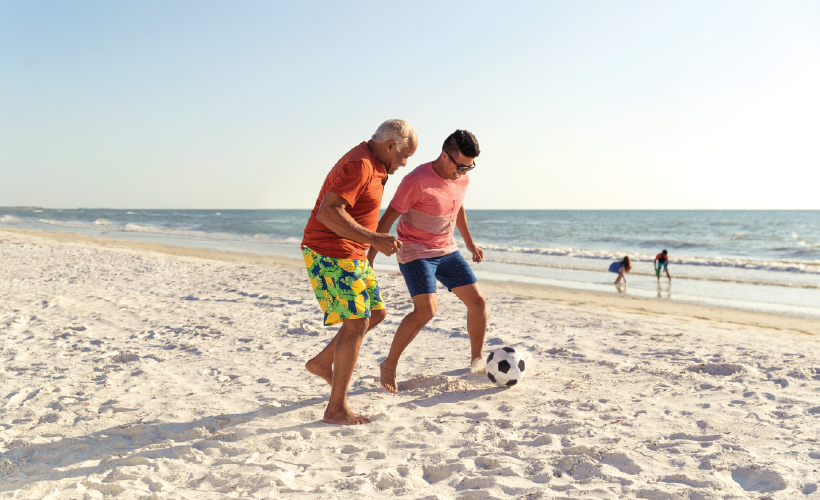
“Few things bring out the kid in all of us like summertime. Even if it’s been decades since you left school for the working world, the season’s atmosphere of joyful freedom remains the same. Just remember that warm weather also brings out the bugs, ragweed and other health concerns. To maximize your fun in the sun, it’s smart to follow a few rules of thumb.
Consider sun-protection clothing
Experts say clothing with built-in sunscreen is worth the investment. Regular summer fabrics may offer only SPF 15 or less. Sun-protection fabric labeled UPF 40 (UPF stands for ultraviolet protection factor) is comparable to wearing SPF 30 lotion ― without the mess. (Just make sure to apply sunscreen to any exposed skin.) The UPF treatment lasts through about 40 washes, or two seasons of frequent use. The downside: The clothing can be pricey. But if you can afford one long-sleeve rash guard, you’ll be happy to have it. Check sportswear shops or search online for “sun protective clothing.”
Drink up to stay hydrated
Think the fuss about drinking water is silly? The truth is that it’s really easy to get dehydrated in hot weather. For kids, older adults and people with health conditions, it can be a life or death matter. Even if you’re young and healthy, losing fluids can cause headaches, nausea and extreme fatigue. So keep a large bottle of water with you whenever you’re outside.
Find out how much water you need to drink in our age-by-age guide.
Wear your sunglasses
You don’t have to stare at an eclipse for your eyes to suffer sun damage. Even on a cloudy day, sunlight can harm tissues in the eye and contribute to cataracts and macular degeneration (a leading cause of blindness). So sunglasses are more than a fashion statement; they truly protect your vision. Look for shades labeled “100% UV protection” or “UV 400.” If there’s no sticker, don’t buy them ― you can’t tell by the darkness or color of the lens what the protection level is. Fortunately, cheap glasses offer the same protection as expensive styles. Not sure if yours are the real deal? Bring them to an optician, who should be able to test the lens for you at no cost.
Now you see it: Learn about healthy habits to help protect your eyesight.
Be a savvy traveler
Call your health insurance company to make sure you’re covered at your destination (if not, ask whether they offer travel insurance). If you’re traveling overseas, ask your doctor about recommended immunizations. Pack extras of any prescriptions you need, and keep a stash of over-the-counter remedies as well, such as ibuprofen, antihistamines, antacids and cortisone cream. Seniors should be especially mindful: Plan ahead, and don’t ignore symptoms on the road.
Discover more great advice for senior travelers.
Soothe rashes and bites
Itchy rashes and bug bites can put a damper on summer fun. Fortunately, a few home remedies can soothe many skin problems. First, avoid scratching (trim those fingernails) and stay away from standard toiletry products ― like soap, lotion and perfume ― which may make rashes worse. Hydrocortisone cream can reduce itchiness and inflammation. Oral antihistamines and pain relievers can also help. Calamine lotion will soothe poison ivy, but may irritate bug bites. For severe skin problems, it’s best to call your doctor. Prescription medicines can help.
Aetna members have access to the Teladoc® Dermatology service, which allows you to upload photos of skin conditions and ask questions; a dermatologist will respond within two days.
Manage your allergies
While summertime brings relief from tree pollen allergies, other triggers are just ramping up. Ragweed, mold and dust mites all flourish in warm temperatures. Plus, sunlight makes smog worse ― and your allergy symptoms. So keep up your allergy treatment through the summer months. Shower before bed to wash off pollen. And run your air conditioner to reduce allergens in your home.
Learn other great allergy management tips.
Let nature nurture you
Don’t let these summer watch-outs discourage you from enjoying the great outdoors. Studies show that being out in nature heals mind and body. Gardening in particular helps people of all ages reduce stress, enhance thinking, build strength and enjoy healthy homegrown food. Digging in the dirt is so good for you that many hospitals, senior centers and rehab facilities incorporate garden therapy into programs for patients recovering from cancer, heart attack, brain injury, post-traumatic stress and chronic pain.
Check with your local botanical garden for workshops in “therapeutic horticulture.” For aspiring gardeners without yards to plant, community gardens are a great resource.
See how gardening helps the students in an alternative school in Florida.
Adjust your bedtime routine
Warm temperatures and more hours of sunlight can make it tougher to fall asleep at night. But simple changes can improve the quality of your sleep. Try avoiding alcohol, heavy meals and electronic devices for several hours before bedtime. They’ve been shown to confuse your internal clock. An evening workout helps some people fall asleep faster and sleep more deeply. And if you have an air conditioner, keep the thermostat between 60 and 67 degrees ― the best temperature for shut-eye.
Check out more tips to help you fall asleep.]
Don’t forget the sunscreen
Last but not least: No matter how dark your complexion, everyone needs to protect their skin with broad-spectrum, SPF 30+ sunscreen every day. You’ll help prevent skin cancer, sunburn and most visible signs of aging. Be especially careful on cloudy days (when 80 percent of harmful rays still get through) and near snow, sand and water, which magnify sunshine. If you’re worried about vitamin D, simply take a supplement.
In the event that you do get burned, know how to treat a sunburn.
Summer is a magical time. With a little forethought, you can avoid common downers and keep the good times rolling. Stay cool!”
For more tips and tricks on ways to improve your health visit Aetna’s website today.



